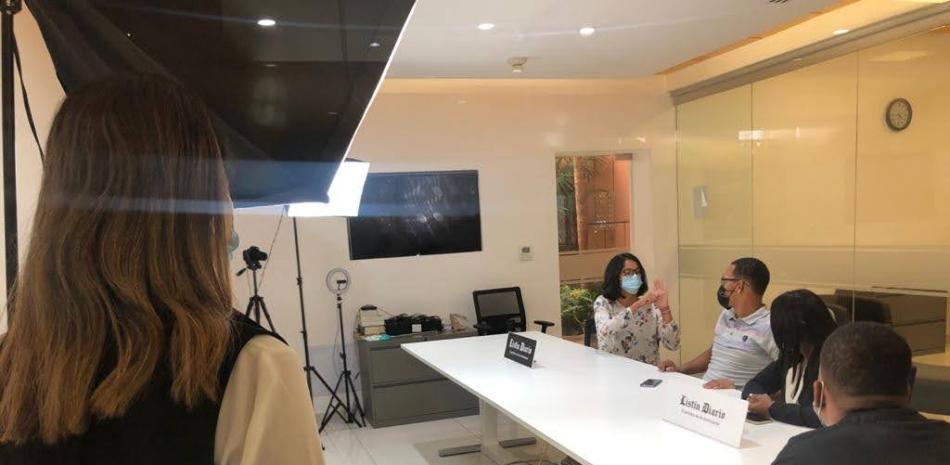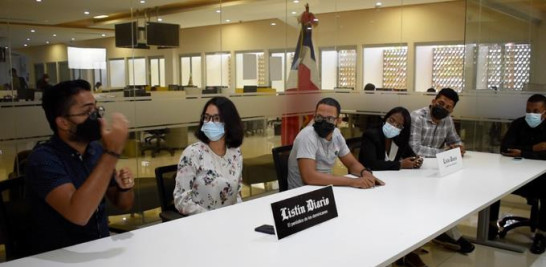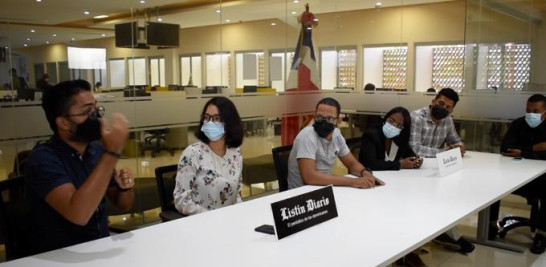Barriers of Silence
After school, what's next for deaf people?

Hearing impairment does not mean a barrier for deaf people ready to enter to the world of work; lack of education does.
"Access to quality education has a direct impact on opportunities for access to the labor market, as it becomes more difficult to have the right profile to compete in positions required by companies," explains Ruth Fernández, an Inclusion and Human Rights Advisor at the United Nations Development Program (UNDP).
José Osvaldo Hidalgo, a young man with hearing disability who has received so many refusals to work, has the dream of being a Physical Education and Sports teacher in an educational center.
José obtained the opportunity to study with a scholarship at an institution of higher education in the country, but the induction process was complicated for him and his friend Adriel Lamarche.
"I was authorized the scholarship, but we were offered an exam; after passing it we took the PAA test, a very in-depth evaluation and even more for deaf people," says Adriel, a 26-year-old and with hearing disability, although partially.
José Osvaldo describes the evaluation as "something difficult to read."
"For the interpreter it was easier to understand the words and simply read the test to us, but we were not allowed to read the test in sign language," says José Osvaldo.
Both attribute their failures to the complexity of the test and, in particular, the vocabulary of the exam.
Adriel and José Osvaldo finished school and prepared to have a job, although they now have difficulties studying at university. But others didn't have a chance to even finish their studies.

Barriers
In previous years, the majority of deaf people entering schools did not even complete high school. Today, this represents one of several barriers for deaf people to get a job.
"Many did not finish because there was no possibility to do so and we know that many jobs have that as a requirement to work," explains Pablo Taveras, president of the National Association of the Deaf (Ansordo).
For those who can get into college, it's not easy either. Jeannette Francisco, director of the National School for the Deaf, describes young people's opportunities as "very limited."
"When a deaf person who has the ability and desire to train in any technical area must like any citizen in the country go to those training institutions, imagine the barrier that is found because there you will not have the opportunity that they have in school to have an interpreter or have a teacher who can communicate with them" , explains Francisco.
Interpreters
The main barrier is communication, not because they have no way to do it, but because the rest of society does not know sign language.
Alternatively, Jeannette Francisco points out that students must afford an interpreter, a service that is high cost because it must cover all hours of classes, and a career takes three to five years, usually. So the fees could be more than RD $25,000 per month.
"It's expensive if we're talking about a deaf person who's in college needing the services of an interpreter, it's even more expensive than college tuition," Francisco adds.
Although there are groups of students who make arrangements and gather small groups from the community to pay for the service, the director of the National School for the Deaf has proposed to higher education academies to have interpreters for careers.
"If we have five deaf people who are interested in studying Physical Education or Special Education, there should be an interpreter who can be on a calendar to attend to those people who are in specific careers," suggests the teacher.
Conflicts
Several years ago, Pablo Taveras, president of Ansordo and sign language advisor at the National Disability Council (Conadis), graduated as a publicist narrates that the beginning of the career was difficult, since the university does not have interpreters and the government does not offer facilities.
"Some teachers also do not understand the issue of deaf culture, (...) how he gives me a bad mark(the teacher) for perhaps not understanding or not fitting in with me; the visual part that we handle; then there were many confrontations to fulfill those four years successfully, "recalls Pablo, who considers that the system still needs many changes to adapt to them.
Similarly, Jeannette Francisco believes that the country must prepare and gradually provide assistance to deaf people’s needs, "because the only problem that deaf people have is communication," unless they have some other disability.
Enthusiasm
Not everything is negative in the process of induction to the university. Priscila Taveras, a Special Education student, remembers that when she started her classmates were excited and wanted to understand part of the deaf culture, so that they could communicate with her.
"In my classes with classmates of the same specialty there were many students who had the interest of learning sign language to maintain better communication," he says with emotion impregnated in his signs.
Similarly, Arabellys Montero pointed out the beginning as difficult, but her classmates and teachers made her feel what she is, another student.
"When I started the classes I didn't know how I was going to work, what I was going to do, I didn't have an interpreter, nobody knew sign language (...) With a lot of effort, trying to ask a lot of questions to the classmates and teachers," Arabellys says between signs and sounds.
Despite these positive aspects, one more barrier remains: the economic one. Pablo, as president of Ansordo urges the Ministry of Higher Education, Science and Technology (Mescyt) to arrange the expenses of at least one scholarship, to find an interpreter for some deaf people and provide education to them as well.
"Many scholarships are given and many millions of pesos are being invested in hearing people, maybe even traveling to another country, but they do not think about deaf people," says Pablo.
Institutions
Two educational institutions that have been dedicated for many years to the teaching and pedagogy of deaf people are the National School for the Deaf and the Santa Rosa Institute for The Deaf.
They are dedicated to offering sign language classes to the families of deaf people, in addition to training their students with technical courses such as electricity or beauty. They also teach extracurricular and artistic activities such as dancing, singing or acting.
They also have workshops on job training and vocational technical training.




